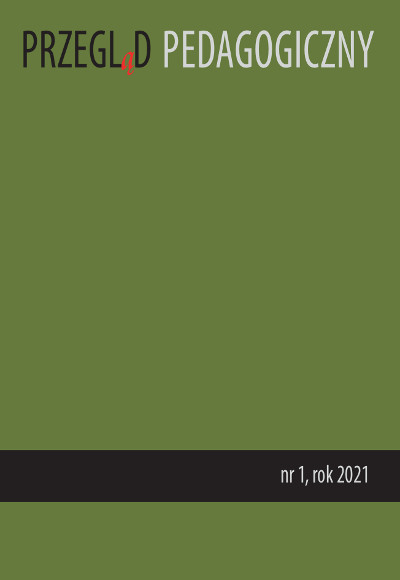The process of motivating to change as a result of early preventive intervention in adolescents who use psychoactive substances
DOI:
https://doi.org/10.34767/PP.2021.02.08Keywords:
motivation, early intervention, brief intervention, change, youthAbstract
The article is an attempt to answer the question whether a short intervention program in the field of addiction prevention affects the motivation to change the risky behaviors of participating adolescents and what is the significance of the level of motivation to change before the start of the impact in this process. The reader has the opportunity to get acquainted with the motivation research tool, the theoretical assumptions underlying its construction, the analysis of direct and deferred results, as well as the interpretations of these results in the authors’ discussion leading to interesting conclusions. The greatest change occurs in young people with the lowest initial motivation
References
Connors G.J., DiClemente C., Velasquez M.M. i Donovan D.M. (2015). Etapy zmiany w terapii uzależnień. Wybór i planowanie interwencji. Kraków: Wydawnictwo Uniwersytetu Jagiellońskiego.
D’Amico E.J., Houk J.M., Hunter S. i in. (2015). Group motivational interviewing for adolescents: Change talk and alcohol and marijuana outcomes. Journal of Consulting and Clinical Psychology, 83(1), 68–80.
D’Amico E.J., Houck J.M., Tucker J.S. i in. (2017). Group motivational interviewing for homeless young adults: Associations of change talk with substance use and sexual risk behavior. Psychology of Addictive Behaviors, 31(6), 688–698.
Davis J.P, Houck J.M., Rowell L.N. i in. (2016). Brief Motivational Interviewing and Normative Feedback for Adolescents: Change Language and Alcohol Use Outcomes. Journal of Substance Abuse Treatment, 65, 66–73.
Falkowski A., Maruszewski T. i Nęcka E. (2010). Procesy poznawcze. W: J. Strelau i D. Doliński (red.), Psychologia akademicka: podręcznik. T. 1 (s. 339–509). Gdańsk: Gdańskie Wydawnictwo Psychologiczne.
Karyś J., Szpringer M. i Karyś T. (2009). Zmiana motywacji do leczenia osób uzależnionych od alkoholu w trakcie terapii odwykowej. Studia Medyczne, 16, 29–34.
Lizyńczyk S. (2016). Adaptacja skali Stadiów Gotowości do Zmiany i Chęci do Podjęcia Terapii (SOCRATES): badania pacjentów oddziałów terapeutycznych dla skazanych uzależnionych od alkoholu i innych środków psychoaktywnych. Przegląd Psychologiczny, 59, (3), 285–308.
Łukaszewski W. (2000). Motywacja w najważniejszych systemach teoretycznych. W: J. Strelau (red.), Psychologia. Podręcznik akademicki. T. 2 (s. 427). Gdańsk: Gdańskie Wydawnictwo Psychologiczne.
Maslow A. (2006). Motywacja i osobowość. Warszawa: Wydawnictwo Naukowe PWN.
Miller W.R. i Rollnick S. (2014). Dialog motywujący. Jak pomóc ludziom w zmianie. Kraków: Wydawnictwo Uniwersytetu Jagiellońskiego.
Naar-King S. i Suarez M. (2012). Wywiad motywujący z młodzieżą i młodymi dorosłymi. Kraków: Wydawnictwo Uniwersytetu Jagiellońskiego.
Oleś P. i Drat-Ruszczak K. (2010). Osobowość. W: J. Strelau i D. Doliński (red.), Psychologia akademicka. Podręcznik. T. 1. (s. 651–762). Gdańsk: Gdańskie Wydawnictwo Psychologiczne.
Prochaska J., Norcross J.C. i DiClemente C.C. (2008). Zmiana na dobre. Warszawa: Instytut Amity
Rejniak R. (2019). Dialog Motywujący jako metoda działania we wczesnej interwencji profilaktycznej. Przegląd Pedagogiczny, 1.
Rubacha K. (2008). Metodologia badań nad edukacją. Warszawa: Wydawnictwo Akademickie i Profesjonalne.
Ryan R. i Deci E. (2000). Self-determination theory and the facilitation of intrinsic motivation. American Psychologist, 55(1), 68–78. DOI: 10.1037/0003-066X.55.1.68.
Stanisz A. (2007). Przystępny kurs statystyki z zastosowaniem STATISTICA PL na przykładach z medycyny: Modele liniowe i nieliniowe. T. 2.
Downloads
Published
Issue
Section
License

This work is licensed under a Creative Commons Attribution-NoDerivatives 4.0 International License.

